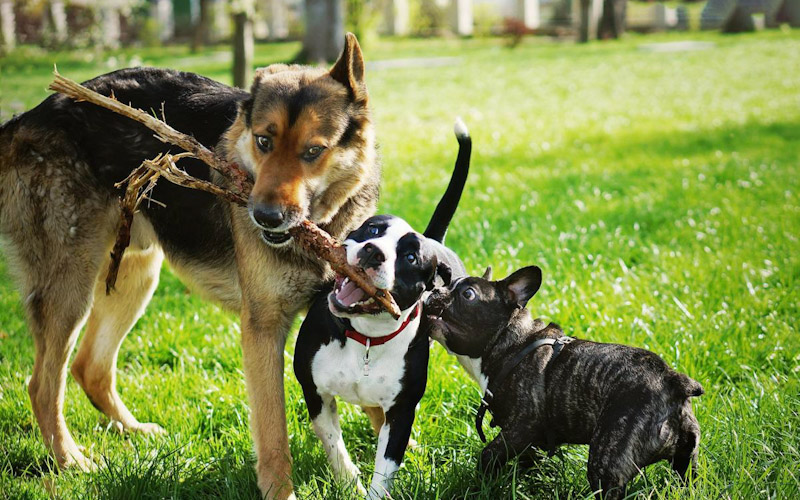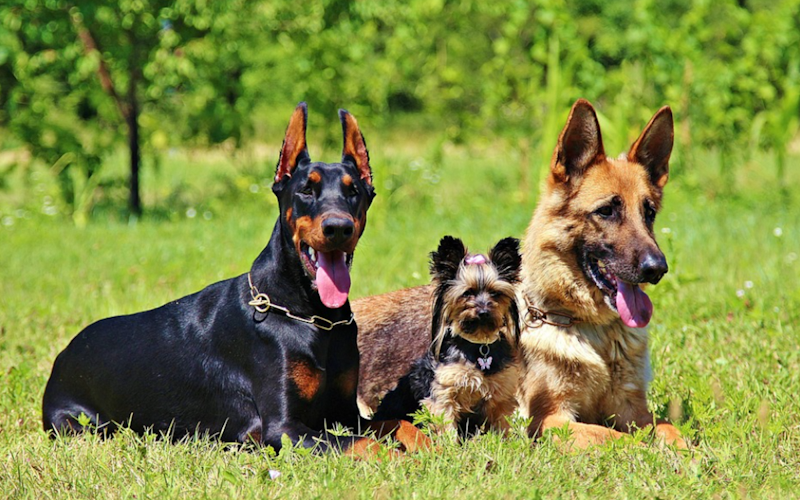German Shepherds are one of the most popular dog breeds in the world, known for their intelligence, loyalty, and courage. They make excellent companions, guardians, and working dogs for various purposes. But do they get along with other dogs?

This is a common question among dog owners and enthusiasts, especially those who are considering adding a German Shepherd to their family. The answer is not straightforward, as there are many factors that can influence the compatibility between German Shepherds and other dogs.
In this article, we will explore some of the factors that affect how well German Shepherds can interact with other dogs, such as socialization, training, and temperament. We will also provide some additional considerations and tips to help you foster harmonious relationships between your German Shepherd and other dogs.
Factors Affecting Compatibility
Socialization
One of the most important factors that can determine how well German Shepherds get along with other dogs is socialization. Socialization is the process of exposing your dog to different people, animals, and environments from an early age, preferably during the first 16 weeks of their life. This helps them develop positive associations and learn how to behave appropriately in various situations.
Proper socialization can help German Shepherds become more confident, friendly, and adaptable to other dogs. They can learn how to read and respond to other dogs’ body language, signals, and cues. They can also learn how to play and have fun with other dogs, without being too rough or aggressive.
On the other hand, lack of socialization can lead to German Shepherds becoming fearful, anxious, or aggressive towards other dogs. They may not know how to communicate or cope with unfamiliar or challenging situations. They may also develop negative associations or prejudices towards certain types of dogs, such as small, fluffy, or noisy ones.
Therefore, it is crucial to socialize your German Shepherd as early and as often as possible, with a variety of dogs of different breeds, sizes, ages, and personalities. You can do this by taking them to puppy classes, dog parks, play dates, or walks with other dogs. You can also expose them to other animals, such as cats, birds, or livestock, to help them become more tolerant and respectful of other species.
Training
Another factor that can influence how well German Shepherds get along with other dogs is training. Training is the process of teaching your dog the rules, boundaries, and expectations of living with you and other members of your household, including other dogs. Training can also help you establish a strong bond and trust with your dog, based on mutual respect and communication.
Training can help German Shepherds learn how to behave properly and politely with other dogs. They can learn how to follow your commands and cues, such as “sit”, “stay”, “leave it”, or “come”. They can also learn how to control their impulses, such as chasing, barking, or jumping on other dogs. They can also learn how to calm down and relax when needed.
Proper training can also help prevent or correct unwanted behaviors, such as aggression, dominance, or possessiveness, that can cause conflicts or fights with other dogs. You can use positive reinforcement methods, such as praise, treats, or toys, to reward your German Shepherd for displaying good manners and obedience. You can also use gentle correction methods, such as verbal cues, body language, or leash pressure, to discourage bad behaviors and redirect your dog’s attention.
It is advisable to start training your German Shepherd as soon as you bring them home, preferably when they are still puppies. You can enroll them in a professional dog training program, or teach them yourself using online resources or books. You can also consult a certified dog trainer or behaviorist if you encounter any issues or challenges with your German Shepherd’s training.
Temperament
The third factor that can affect how well German Shepherds get along with other dogs is temperament. Temperament is the innate personality and disposition of your dog, influenced by their genetics, breeding, and individuality. Temperament can affect how your dog perceives and reacts to other dogs, as well as their overall compatibility and preference.
German Shepherds are generally intelligent, loyal, and protective dogs, who are devoted to their owners and family. They are also alert, active, and curious, who enjoy learning and working. These traits can make them great partners and friends for other dogs, who share similar characteristics or interests.

However, these traits can also pose some challenges or difficulties for German Shepherds when interacting with other dogs. For instance, their intelligence can make them bored or frustrated if they are not stimulated or challenged enough. Their loyalty and protectiveness can make them wary or defensive of strangers or intruders, including other dogs. Their alertness and activity can make them restless or hyperactive if they are not exercised or entertained enough.
Therefore, it is important to understand and respect your German Shepherd’s temperament, and match them with other dogs who are compatible or complementary to them. You can also look for reputable and responsible breeders, who can provide you with health and temperament tests, as well as pedigree and background information, of their German Shepherd puppies. This can help you choose a German Shepherd who has a good temperament and is suitable for your lifestyle and expectations.
Additional Considerations
Besides the factors mentioned above, there are some other considerations that can affect how well German Shepherds get along with other dogs, such as:
- Age and size: The age and size differences between dogs can affect their compatibility and interaction. For example, older or larger dogs may not tolerate or appreciate the energy or playfulness of younger or smaller dogs. Similarly, younger or smaller dogs may feel intimidated or overwhelmed by older or larger dogs. Therefore, it is advisable to introduce and supervise dogs of different ages and sizes carefully and gradually, and respect their individual needs and preferences.
- Neutering/Spaying: The reproductive status of dogs can also affect their compatibility and interaction. For example, intact dogs may display more dominance or aggression towards other dogs, especially of the same sex or during mating seasons. They may also be more prone to roaming or escaping, which can expose them to risks or dangers. Therefore, it is recommended to neuter or spay your German Shepherd, unless you have a valid reason or plan to breed them. This can help reduce their hormonal or behavioral issues, and improve their health and well-being.
- Supervised Interaction: The level of supervision and guidance you provide to your German Shepherd when interacting with other dogs can also affect their compatibility and interaction. For example, unsupervised or uncontrolled interaction can lead to accidents, injuries, or fights, especially if the dogs are unfamiliar or incompatible with each other. Therefore, it is important to supervise and monitor your German Shepherd when introducing them to new dogs, or when allowing them to play or socialize with other dogs. You should also intervene or separate them if you notice any signs of tension, discomfort, or aggression.

Conclusion
German Shepherds can get along with other dogs, depending on various factors, such as socialization, training, and temperament. By providing your German Shepherd with proper socialization, training, and responsible pet ownership, you can help them develop positive and harmonious relationships with other dogs. You can also consider some additional factors, such as age, size, neutering/spaying, and supervised interaction, to ensure the safety and well-being of your German Shepherd and other dogs.
German Shepherds are wonderful dogs, who can be loyal, loving, and fun companions for you and other dogs. With the right care and management, you can enjoy the benefits and joys of having a German Shepherd and other dogs in your life.
